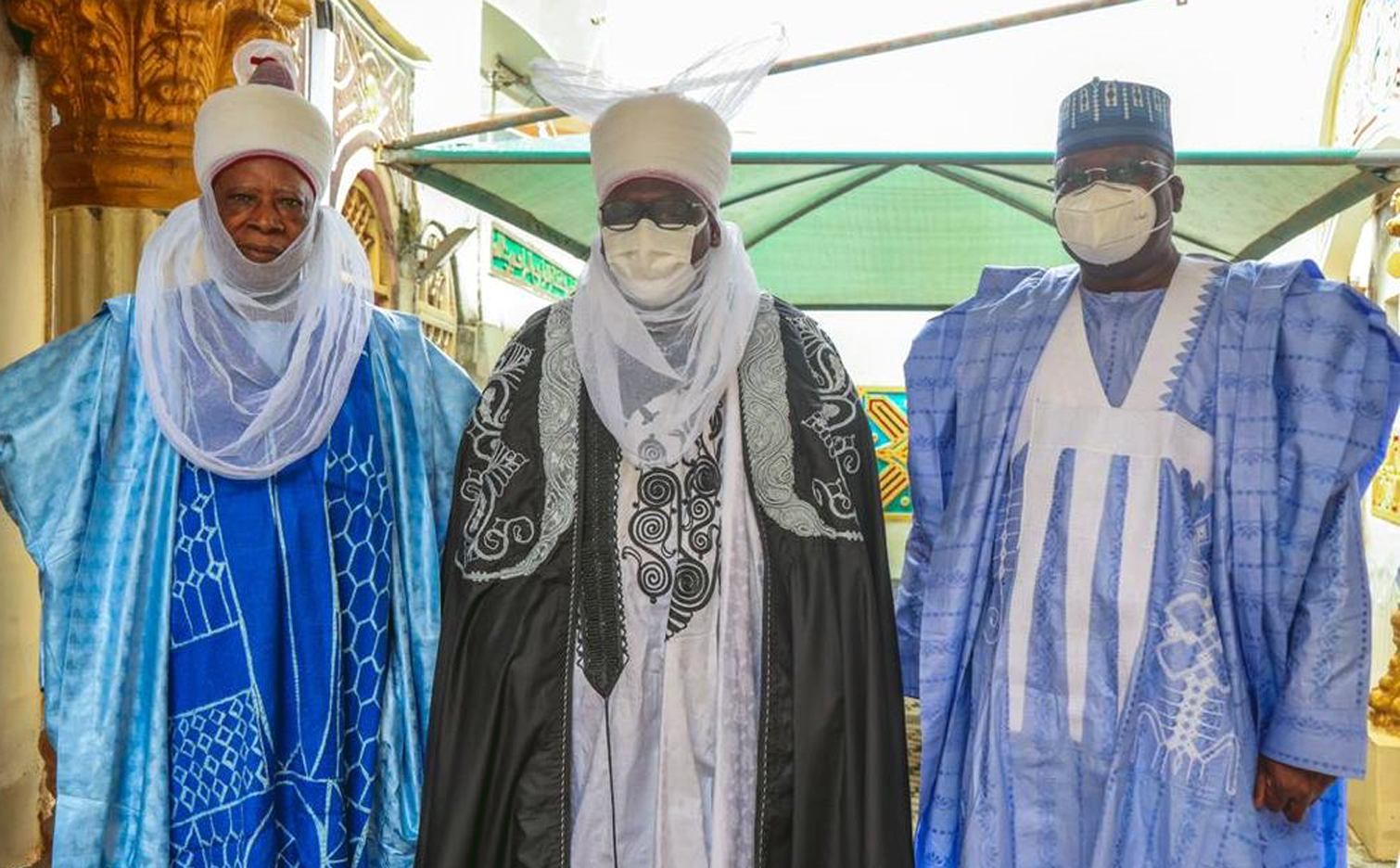Oil & Energy
‘Ajaokuta – Kaduna – Kano Gas Project To Be Ready In 2022’
Group Managing Director, Nigerian National Petroleum Corporation (NNPC), Maikanti Baru, says that the Ajeokuta-Kaduna-Kano (AKK) gas pipeline project will be completed by 2022.
Baru disclosed this while delivering a keynote address at the 19th Oloibiri Lecture Series and Energy Forum in Abuja, last Thursday.
He spoke on the topic ” The Road Map for Energy sustainability in Nigeria”.
Oloibiri was the first place oil was discovered in Nigeria on January 15, 1956.
Oloibiri Oilfield is an onshore field located in Oloibiri in Ogbia Local Government Area of Bayelsa.
Oloibiri Lecture series is an annual event that brings stakeholders in the industry together to discuss issues that would drive growth and development of the sector.
“The Ajaokuta-Kaduna-Kano pipeline that is proposed to convey gas from the Niger Delta, through Ajaokuta to Kaduna and Kano, will be completed by 2022,” he said.
According to him, the pipeline, when installed, will also supply 3,600 mega watts of power to the national grid.
He also noted that the visibility study on Nigeria/Morocco gas pipeline project had been completed, adding that phase one of the field work was equally finalised.
He said it was unfortunate that in spite of the abundant oil and gas reserves, Nigeria continued to experience shortages in electric power.
He said that based on available data, Nigeria’s energy consumption was projected to rise from six Gigawatts (GW) in 2015 to 30 by 2025
Baru said that to achieve this, the country would need aggressive development of gas and renewable projects.
He added that the 1.1 billion standard cubic feet (SCF) of gas, 342 kilometres by 36 inches Escravos-Lagos Pipeline System, ELPS II, had achieved 97 completion.
He said the remaining 70 kilometres of the pipeline would be completed by the middle of 2019.
“The 130 kilometres by 48 inches/36 inches Obiafu/Obrikom-Oben, OB3, pipeline with the capacity to link the eastern and western parts of the country with about two billion SCF of gas daily, was at 92 per cent completion and would also be concluded by the middle of the year,” he said.
The Managing Director of Shell Nigeria Exploration and Production Company (SNEPCO), says the Nigeria’s energy supply remained very poor.
He also lamented that 70 per cent of households and small businesses in Nigeria hardly get more than four hours of electricity daily.
This, he said, was because 70 per cent of electricity generated by power companies was lost before it got to the consumers.
Oil & Energy
Hedge Funds Turn Bearish On Oil, Bullish On Natural Gas

Traders have not been this bearish on oil in months or so bullish on United States natural gas in years.
The latest data on money managers’ positioning in the WTI and Brent crude and U.S. natural gas futures showed two contrasting trends—speculators are betting that oil prices would remain low or go even lower while increasing the bets that natural gas prices would continue marching higher.
So far this year, geopolitical and supply and demand factors have been increasingly bearish for the oil price outlook and increasingly bullish for natural gas prices.
In the oil market, hedge funds and other portfolio managers have been slashing their bullish bets since the end of January, when the U.S. sanctions on Russia’s oil trade were the primary bullish driver of managed money to bet on a tightening market.
With U.S. President, Donald Trump, now in office, the sentiment has quickly soured amid the president’s insistence on lower oil prices, his efforts to broker an end to the war in Ukraine, and – most of all – the enormous uncertainty about on-and-off tariffs and tariff threats and their potential impact on the American economy.
As a result, market participants are preparing for lower oil prices, even amid expectations of declining oil supply from Iran and Venezuela due to President Trump’s hawkish policy toward these OPEC producers.
Speaking of OPEC, the wider OPEC+ group has just said it would begin increasing supply as of April, adding further downward pressure on prices.
Faced with all these bearish drivers, money managers have been reducing their bullish bets on crude oil futures, with the U.S. WTI Crude hitting the lowest net long position – the difference between bullish and bearish bets – in 15 years at the end of February.
In the week to March 4, the latest reporting week with data released on March 7, speculators bought WTI amid a major selloff in all other commodities except for U.S. natural gas.
The net long in WTI rebounded from the 15-year low, but it wasn’t because the market suddenly started betting on higher prices going forward. The rise in WTI buying and the net long was the result of short covering in the U.S. crude futures contract.
In Brent, hedge funds cut their bullish-only bets in the week to March 4 for the biggest decline in longs since July 2024.
Unlike in crude oil, money managers have become increasingly bullish on U.S. natural gas after inventories dipped this winter to below the five-year average as demand surged in the coldest winter for six years.
The net long in natural gas further swelled in the week to March 4, as the number of new bullish bets was four times higher than the new short positions.
“Natural gas continues to benefit from rising demand, both domestically in the US and towards exports via LNG,” Ole Hansen, Head of Commodity Strategy at Saxo Bank, said, commenting on the latest Commitment of Traders report.
At the start of the winter heating season in November, U.S. natural gas inventories were higher than average for the time of the year as America entered the season with stocks at their highest level since 2016.
These stocks, however, were quickly depleted during the coldest winter for six years, with demand for space heating and power generation soaring. A month before the end of the winter heating season, U.S. natural gas inventories have now slumped to below the five-year average and well below the levels from the same time in 2024, at the end of a mild winter.
The lower inventories and the higher demand – both for domestic consumption and LNG exports – have pushed prices higher, encouraging producers to boost gas output this year. Traders bet that prices will go even higher as demand from LNG plants is set to accelerate with the ramp-up of new U.S. export plants.
Paraskova writes for Oilprice.com.
By: Tsvetana Paraskova
Oil & Energy
Renaissance Finalises Acquisition Of SPDC

Renaissance Africa Energy Holdings says it has successfully completed the acquisition of 100 percent equity holding in the Shell Petroleum Development Company of Nigeria (SPDC).
Spokesperson of the company, Tony Okonedo, who disclosed this in a Press Release, Last Thursday, said Renaissance has completed all processes for the full transfer of ownership of SPDC to the consortium, adding that it will now operate as Renaissance Africa Energy Company Limited.
“Renaissance Africa Energy Holdings today announced that it has successfully completed the landmark transaction between itself and Shell for the acquisition of the entire (100%) equity holding in the Shell Petroleum Development Company of Nigeria (SPDC).
“This follows the signing of a sale and purchase agreement with Shell in January 2024 and obtaining all regulatory approvals required for the transaction. Going forward, SPDC will be renamed as ‘Renaissance Africa Energy Company Limited.
“Going forward, SPDC will be renamed as ‘Renaissance Africa Energy Company Limited’.
“Renaissance Africa Energy Holdings is a consortium consisting of four successful Nigerian independent oil and gas companies: ND Western Limited, Aradel Holdings Plc. FIRST Exploration and Petroleum Development Company Limited and the Waltersmith Group, each with considerable operations experience in the Niger Delta, and Petrolin, an international energy company with global trading experience and a pan African outlook”, the statement reads.
Speaking on the acquisition, the Managing Director/CEO, Renaissance Africa Energy Holding,Tony Attah, said Renaissance Africa Energy Company Limited has a vision to be the leading oil and gas producer in Africa and to help the continent achieve energy security.
Attah expressed gratitude to the Federal Government for its support and pledged the company’s commitment to the Petroleum Industry Act.
“We are extremely proud to have completed this strategic acquisition. The Renaissance vision is to be ‘Africa’s leading oil and gas company, enabling energy security and industrialization in a sustainable manner’.
“We and our shareholder companies are therefore pleased that the Federal Government has given the green light for this milestone acquisition in line with the provisions of the Petroleum Industry Act”, he said.
The CEO acknowledged the contributions of Nigeria’s Minister of Petroleum Resources, the Nigeria Upstream Petroleum Regulatory Commission (NUPRC), and the Nigerian National Petroleum Company Limited (NNPCL) in facilitating the deal.
He said, “we extend our appreciation to the Honourable Minister of Petroleum Resources, the CEO of the Nigeria Upstream Petroleum Regulatory Commission (NUPRC), and the CEO of Nigeria National Petroleum Company Limited (NNPCL) for their foresight and belief, paving the way for the rapid development of Nigeria’s vast oil and gas resources as strategic accelerator for the country’s industrial development”.
The Statement further revealed that Renaissance partner companies collectively have an asset base of more than $3 billion and currently safely produce approximately 100,000 barrels of oil per day (bpd) from 12 oil mining leases and operate two functioning modular refineries in Nigeria’s Niger Delta.
Oil & Energy
Oil-Rich Communities Must End Infighting To Access Dev Funds – FG

The Federal Government has cautioned oil-rich communities against infighting and disruption of oil production, saying it could hinder their access to the Host Community Development Fund.
Minister of State for Petroleum (Oil), Heineken Lokpobiri, made the appeal while speaking at the KEFFESO Stakeholders Forum, in Yenagoa, Bayelsa State.
Lokpobiri noted that the Petroleum Industry Act (PIA) was enacted to bring stability to the oil sector and address longstanding grievances about underdevelopment in host communities.
He lamented, however, that internal disputes among stakeholders have made it difficult for these communities to access and utilize the funds meant for their development.
Lokpobiri insisted that host communities must overcome internal conflicts that hinder their access to the funds.
“This KEFFESO Stakeholders Forum is to see how host communities can maximize the benefits from the Host Communities Trust Funds as prescribed by the PIA.
“If oil production is disrupted, everyone loses — the Federal Government, oil companies, and the host communities themselves. That is why host communities must collaborate with the government and oil companies to ensure smooth operations” Lokpobiri stated.
The Minister called on Host Community Development Trusts (HCDTs) in the Niger Delta to effectively utilize the 3% operational funds allocated to them under the PIA 2021 to drive sustainable development.
He further called that oil-producing communities should take ownership of the oil and gas facilities within their domains and work with relevant stakeholders to ensure sustainable benefits.
“As stakeholders who have their respective stakes in oil and gas operations in the country, we should work together to ensure that we maximize the benefits of oil and gas.”
The minister also emphasized the global push for cleaner energy, warning that the relevance of fossil fuels depends on their extraction and marketability.
“Don’t forget there is a global campaign against the continuation of production of fossil fuel.
“Fossil fuel will never go away. Fossil fuel will not have any value unless you bring it out of the ground or from the sea to the market, that is why we need this collaboration,” he said.
In his remarks, the Executive Secretary, Nigerian Content Development and Monitoring Board (NCDMB), Engr. Omotsola Ogbe, reaffirmed the board’s commitment to leveraging the provisions of the Nigerian Oil and Gas Industry Content Development (NOGICD) Act.
Represented by the Board’s Director of Legal Services, Naboth Onyesoh, Ogbe noted that the NCDMB’s Community Content Guidelines were designed to ensure sustained community engagement as local content is prioritized throughout the oil and gas value chain.
Ogbe praised the KEFFESO Host Community Development Trust for its efforts in ensuring that oil revenues benefit local communities.
Also speaking, the Managing Director and Chief Executive Officer, First E & P, Ademola Adeyemi-Bero, described the KEFFESO Stakeholders Forum as a crucial platform for discussing and strategizing solutions to the challenges facing marginalized communities in the Niger Delta.
He reiterated the company’s commitment to fostering meaningful and sustainable development in the region.
The forum, themed “Envisioning Sustainable Community Development in Niger Delta Host Communities: Identifying Challenges and Actualising The PIA Paradigm Shift,” brought together key stakeholders to discuss strategies for maximising the benefits of the Petroleum Industry Act(PIA).
-
Niger Delta2 days ago
Diri Recommits To Support For Security Agencies …Cautions AIG, Sacks Youth Exco
-

 Nation2 days ago
Nation2 days agoOgun, Nike Art Gallery Set To Transform Olumo Rock
-
Social/Kiddies2 days ago
Need For Girl-Child Education In Society
-

 News2 days ago
News2 days agoNBA President Sues For Workers’ Protection, Better Wage
-
Politics2 days ago
Gunmen Disrupt Political Rally In Bayelsa ….As Turnah, Others Emerge New Associates’Leaders
-

 Rivers2 days ago
Rivers2 days agoSecurity Agencies Engage Rivers Communities On Pipeline Protection
-

 Nation2 days ago
Nation2 days agoNasarawa Varsity Student Commits Suicide
-
Business2 days ago
Smuggled Rice Tops Seized Items List In 2025

